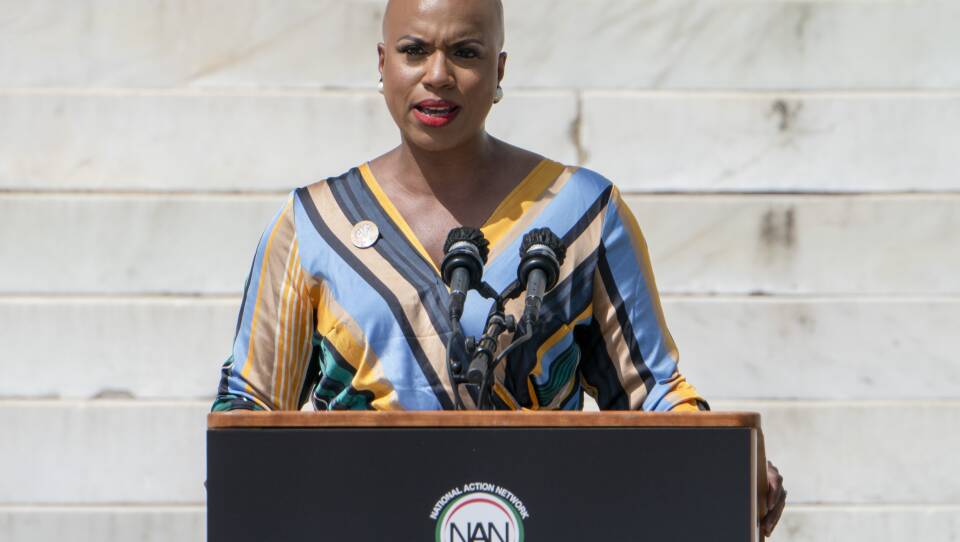Massachusetts U.S. Rep. Ayanna Pressley on Tuesday called on Gov. Charlie Baker to release inmates from state jails and prisons struggling with a recent outbreak of COVID-19.
"The governor alone, with the stroke of a pen, has the power to pardon or commute the sentences of thousands of medically vulnerable people behind the wall and to reunite them with their families, drastically reducing the population and crowding of our prisons and jails and slowing the spread of COVID-19 in these facilities," Pressley said. "Now is not the time for half measures of virtue signaling."
Pressley was joined at a press conference outside the State House by Suffolk County District Attorney Rachael Rollins, State Sen. Becca Rausch, Carlene Pavlos of the Massachusetts Public Health Association, Dr. Monik Jiménez of the Harvard T.H. Chan School of Public Health and Elizabeth Matos of Prisoners’ Legal Services. They are seeking the “decarceration” of hundreds of inmates who they say, “cannot socially distance or otherwise protect themselves.”
The Department of Corrections said Tuesday that 172 prisoners at Massachusetts Correctional Institution in Norfolk have tested positive for the coronavirus — up from 140 people on Monday . Three people are now being cared for at nearby hospitals. Other institutions have experienced similar spikes in infection, including 137 prisoners at the Middleton Jail and House of Correction.
The governor did not immediately respond to a request for comment.
Criminal defense attorney Lisa Newman-Polk said she is concerned about the health of a client at MCI-Norfolk who has health issues that make him susceptible to the disease.
She released an affidavit that she says is being filed Tuesday to the Massachusetts Parole Board in hopes of expediting the release of the client, whom she declined to identify.
“He is a highly medically compromised person who I have serious concerns could become gravely ill or die if he contracts this disease,’’ she said.
In the affidavit, Newman-Polk says she has two other clients at Norfolk who already have tested positive for the disease.
She says sick prisoners are being moved to quarantine units that hold approximately 80 people, sharing three toilets and three urinals. “The units are filthy with dust everywhere,’’ the affidavit says. “The quarantined prisoners who are well enough are doing what they can to clean the units; however, they have not been provided proper cleaning supplies.”
Department of Correction officials could not immediately be reached for comment on her allegations.
Locked in on four sides in tiny spaces, inmates nationwide have experienced a disproportionate rate of infections. But official responses have differed state by state. New Jersey released over 2,000 incarcerated people in response to COVID-19 just last week, and California officials recently ordered the release of more than 8,000 people.
Far fewer who have been diagnosed with the virus have been released in Massachusetts. Eight state prisoners have died of COVID-related illnesses and an estimated 540 people behind bars have tested positive, according to the American Civil Liberties Union of Massachusetts.
Jimenez, who said her father spent his lifetime behind bars, said the rate of infection of people incarcerated in Massachusetts facilities is three times higher than that of the general population, and nearly five times higher than that of the country. “It is critical to know that all of this data is an underestimate,” she said.
Rollins explained that COVID-vulnerable men and women in Massachusetts must pass three criteria to eligible for release. They must "prove that they either have an underlying comorbidity or a factor that makes them more susceptible to COVID," she said, as well as have a colorable claim and an entry plan back into the community.
But Rollins said poverty could make the latter qualification difficult for some to achieve.
"We are now penalizing poverty, and people that might not have a home to return to or family to return to," she said. "So if you are a white collar criminal and you want to return back to Wellesley, it's likely that you're going to have a place to go. But if you are a convicted felon and want to return back to your mother's home, who is on Section 8 [housing], there might be hurdles you have to clear in order to do that."
There must be exceptions, Rollins said.
“Even if somebody might not be eligible for release, we don't believe they should die in a correctional facility under the watch of Secretary Turko and Governor Baker," she said. "We have to be better with respect to what they are doing.”





